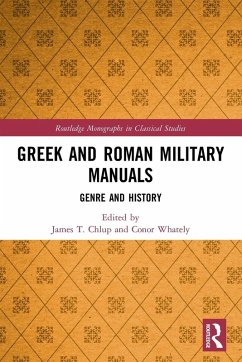
Byzantine Military Rhetoric in the Ninth Century
A Translation of the Anonymi Byzantini Rhetorica Militaris
Versandkostenfrei!
Versandfertig in 1-2 Wochen
64,99 €
inkl. MwSt.
Weitere Ausgaben:

PAYBACK Punkte
32 °P sammeln!
Byzantine Military Rhetoric in the Ninth Century is the first English translation of the ninth-century Anonymi Byzantini Rhetorica Militaris. Including a detailed commentary and critical introduction, it will appeal to all those interested in Byzantine political ideology and military history.













